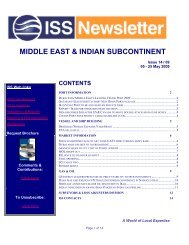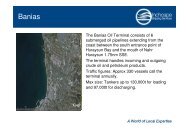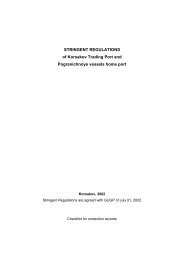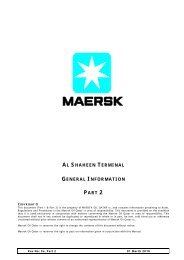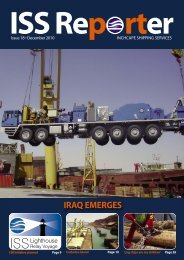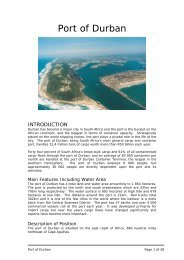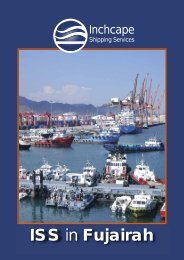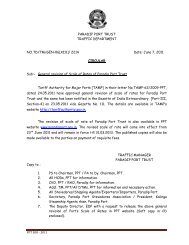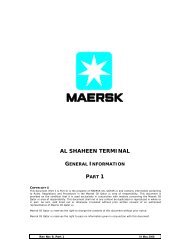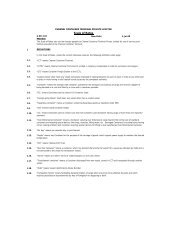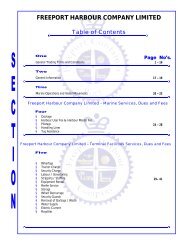Prigorodnoye Export Terminal Port Regulations.pdf - Inchcape ...
Prigorodnoye Export Terminal Port Regulations.pdf - Inchcape ...
Prigorodnoye Export Terminal Port Regulations.pdf - Inchcape ...
You also want an ePaper? Increase the reach of your titles
YUMPU automatically turns print PDFs into web optimized ePapers that Google loves.
<strong>Prigorodnoye</strong> <strong>Export</strong> <strong>Terminal</strong> <strong>Port</strong> <strong>Regulations</strong> Rev 01<br />
The tanker is responsible for dealing with any emergency on board, utilising such assistance<br />
that is available from the terminal. The Emergency Control Centre will co-ordinate with the<br />
tanker regarding any necessary assistance.<br />
The terminal is responsible for dealing with all emergencies ashore. The Emergency Control<br />
Centre shall liaise with any tanker alongside to keep them fully appraised of the situation and<br />
any developing risk.<br />
The Loading Master or his designated deputy is responsible for providing marine advice to the<br />
Emergency Control Centre. This includes, but is not limited to, analysing the incident,<br />
determining the need for response, call out and mobilisation of marine resources, liaising with<br />
governmental and local authorities and maintaining communications with the ship.<br />
The Offshore Marine Coordinator shall be the Loading Master or the Master of the duty tug or<br />
other delegated marine personnel. The role of the Offshore Marine Coordinator during a<br />
marine incident shall be to control marine activities offshore, and keep <strong>Prigorodnoye</strong><br />
the shore Common Facility Supervisor and Emergency Control Centre fully appraised of the<br />
offshore situation.<br />
31.2 Safety Alongside<br />
The Master is responsible for the safe operation of his ship (including cargo-handling<br />
operations) and the safety of ship’s personnel at all times. The Master will be required to sign<br />
a letter acknowledging his responsibility in this respect.<br />
The Responsible Ship’s Officer delegated the task of controlling cargo operations and other<br />
related duties must be qualified and competent to do so and either himself, or a delegated<br />
ship’s duty officer, should remain in the ship’s cargo control room throughout cargo<br />
operations in order to ensure that the ship/shore liaison is continuously maintained. In addition<br />
to the Responsible Ship’s Officer, or his deputies, sufficient personnel should be available in<br />
order to maintain an efficient deck and cargo watch.<br />
The following procedures should be used as a supplement to and in conjunction with the<br />
appropriate <strong>Prigorodnoye</strong> LNG Emergency Response Plans:<br />
• Onshore Fire Alarm (Continous sounding of alarms).<br />
• Onshore Gas Alarm (Intermittent sounding of alarms).<br />
• Shipboard emergency procedures with specific shipboard communication of such, ie.<br />
Public address system announcement.<br />
• At least six (6) long blasts on the ships whistle each of not less than 10 seconds<br />
duration.<br />
31.3 Communications<br />
The terminal, on notification of the shipping 72 hr pre arrival messages, will forward the advice<br />
to the LNG on duty personnel by fax who will acknowledge this notification to the terminal and<br />
advise the appropriate LNG operations personnel of the forthcoming shipping movements.<br />
Note:- On return acknowledgment of shipping advice, the LNG terminal personnel will also<br />
advise of any shore activities which the terminal and Loading Master should be made aware<br />
of.<br />
0000-S-90-01-P-0207-00-E<br />
Page 59 of 101<br />
BM Code: EP.14.03.01.09



